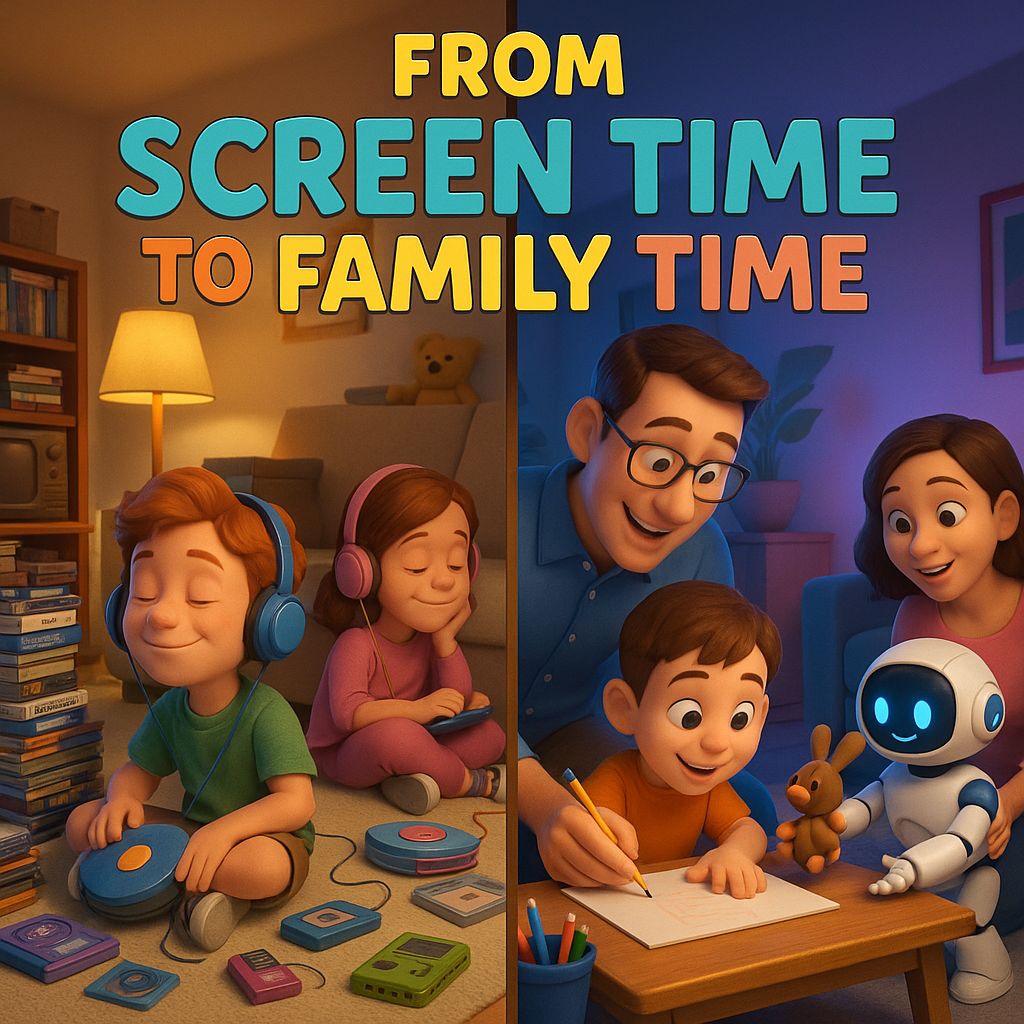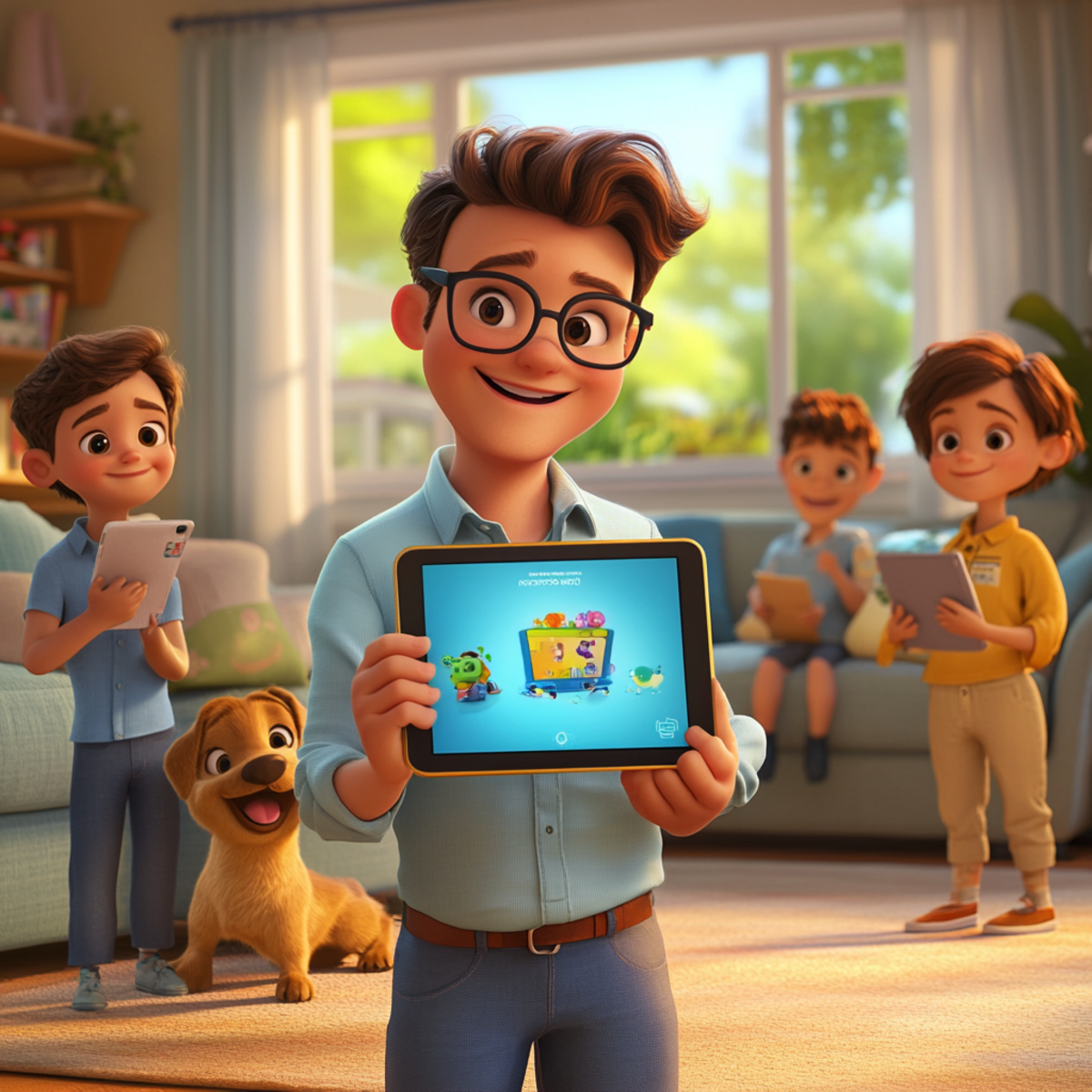Monday, August 18, 2025
A Personal Note
This weekend was hard. On Saturday, my grandma Alice passed away. I'm still processing, still finding my footing in this new reality where her voice isn't a phone call away. She was in her 90’s, lived a full life, and left a legacy behind with her family; all the things we're supposed to take comfort in.
Last night, my 7-year-old asked if we could "save Grandma's voice somewhere" so she wouldn't forget what it sounded like. Her question broke my heart and sparked my brain simultaneously. My 2-year-old won't have conscious memories of Great-Grandma Alice, but could technology help preserve something of her essence?
It got me thinking about all the ways we're now using AI and digital tools not just for productivity or entertainment, but for the deeply human work of remembrance and healing. So this newsletter has taken an unplanned turn. Instead of our scheduled content, I want to share some thoughts on using technology to help us cope with loss and preserve what matters most.
If you're dealing with grief right now too, I'm with you. If not, maybe file this away for when you need it. Because eventually, we all do.
Using AI to Cope and Remember

When someone we love dies, we cling to what remains—photos, voicemails, handwritten notes. Technology now offers new ways to preserve and interact with these precious artifacts.
Creating Digital Memorials
Photo collections can become something more dynamic with AI-assisted curation. Upload photos to Google Photos or Apple Photos, and AI will identify the person, organize chronologically, and even suggest collections based on events or time periods.
Video montages from still photos have become more sophisticated. Tools like CapCut or DaVinci Resolve now include AI features that can animate still photos, add subtle motion effects, and sync perfectly to music.
Memorial websites have evolved beyond simple photo galleries. Platforms like Gather.Town can create virtual spaces where family members from around the world can "gather" in avatar form to share memories.
Preserving Voice and Personality Here's where things get both amazing and complicated.
Voice cloning technology has advanced dramatically. With just a few minutes of recorded speech, services can generate new audio in that person's voice. My daughter's question about saving Grandma's voice isn't just wishful thinking—it's technically possible.
You can now train basic chatbots on text messages, emails, or social media posts from a loved one. Some services claim to create AI "personas" that mimic communication patterns of the deceased.
But should we?
This is where I had to stop and think hard as both a tech enthusiast and a parent trying to guide my kids through grief.
Earlier this week, Consumer Reports delivered a petition signed by 75,000 consumers urging the FTC to establish guardrails around AI voice cloning. The technology that could help preserve Grandma's stories could also be used by scammers. There's something deeply personal about someone's voice that perhaps shouldn't be replicated without careful consideration.
For our family, I've decided on this middle path:
We'll preserve the authentic recordings we have—voicemails, videos, audio messages
We'll use AI to enhance and restore quality where needed
We'll create a searchable digital collection of her written words and wisdom
But we won't generate new content in her voice or create a chatbot version of her
The goal isn't to create an artificial replacement, but to preserve authentic connections to who she really was.
Practical Steps You Can Take If you want to create meaningful digital memorials:
Gather and digitize everything: Record family members sharing memories, scan handwritten notes, digitize old photos
Create organized archives: Use Google Drive or Notion to build searchable collections
Consider audio preservation: Services like Descript can enhance audio quality of old recordings
Start a memory journal: Use journaling apps with AI assistance (like Jour or Reflect) to process grief and record memories
Create family rituals: Set calendar reminders for regular family sharing of memories
Ethical Considerations If you're considering more advanced AI approaches:
Always get family consensus before creating AI-generated content of deceased loved ones
Be transparent with children about what's real vs. generated
Consider the deceased person's likely wishes about their digital afterlife
Recognize AI limitations—these are echoes, not the person themselves
Keep security and privacy at the forefront—protect intimate details and voice data
This Week's News Roundup
Back-to-School Countdown Can you believe summer's almost over? This is the last week before my 7-year-old starts second grade, and I'm feeling that familiar mix of relief and nostalgia.
For families adjusting to school schedules, sleep experts recommend gradually shifting bedtimes earlier starting now—about 15-30 minutes each night. My strategy: dimming lights earlier and swapping screen time for audiobooks in the evening.
K-12 parents are spending more on tech this year according to Yahoo's back-to-school survey, with 70% planning increased budgets for tech essentials. If you're shopping, focus on durability over flashy features for younger kids.
Digital Memorial and Voice Technology Updates Beyond the Consumer Reports petition mentioned earlier, there's growing discussion about how AI memorialization should be regulated. The technology is advancing faster than the ethical frameworks to guide it.
Researchers at the University of Amsterdam discovered that even AI systems with good intentions tend to self-polarize into echo chambers—something to keep in mind as we build AI tools for sensitive purposes like grief support.
🎤 Ready to Make 2026 Your Breakthrough Year for You AND Your Family?
Join Me at the Goal Achievers Summit — Orlando, Dec 29-30!

🌟 This isn’t just another conference. It’s a two-day, life-changing reset for people who are DONE playing small and READY to make big moves.
Here’s the deal:
40 world-class speakers (including me!),
Thousands of actionable ideas for every area of your life - including family,
All dedicated to helping you create the year you’ve always wanted.
And right now, I’ve got a limited number of exclusive tickets at just $100. (After those are gone, the price jumps to $697. Don’t wait!)
Why join me?
Here's the game-changer: our Master Mind groups.
Every attendee gets matched with like-minded professionals who become your accountability partners for the entire year - (who knows, I might even be your accountability partner). When you want to quit on your Q2 goals, they won't let you. When you hit a breakthrough in Q3, they'll celebrate with you.
It's like having a personal board of directors who are just as committed to your success as you are.
This is why Goal Achievers Summit isn't just another conference - it's a complete achievement ecosystem that supports you long after December 30th ends.
Unbeatable value: Full 2-day pass for less than dinner and a movie.
Hilton Orlando perks (where the conference is being held): $159/night rooms, NO resort or parking fees, and all the extras (WiFi, fitness, more).
Make it a family getaway: Stay for New Year’s Eve fireworks! I’m bringing my family!
Perfect timing: Reflect, plan, and network with growth-minded achievers as you launch into 2026.
🔗 Grab your ticket now: 👉 Secure Your $100 Spot
Picture yourself in the room, shaping your next chapter. Don’t just dream big - act BOLD. Only a handful of tickets left at this price. When they’re gone, they’re gone, and the price goes to $697…
Let’s make this the year everything changes. See you in Orlando!
Got questions? Just hit reply and ask. I’m happy to share more!
Recent Blog Posts
Two Weeks Left: How Families Can Use AI to Squeeze the Most Out of Summer - Make the last days of summer count with AI-powered planning tools.
ChatGPT-5 Is Here: How Parents Can Use the New Model—Safely, Smartly, and Creatively - Learn how ChatGPT-5's smarter reasoning and longer memory can help with family projects.
Back-to-School Success: How to Use AI and Smart Home Tech for Family Goal Setting - Set up systems now for a smoother school year ahead.
Remembering Together: A Family Activity

This week, our family is creating a "Grandma Alice Memory Jar." We're writing memories on colorful paper slips, folding them, and adding them to a mason jar my grandmother gave us years ago.
When we miss her, we'll pull one out to read. My 7-year-old suggested we use ChatGPT to turn some memories into simple stories we can illustrate. Maybe we'll try that too.
If you've lost someone special, consider creating your own memory jar, digital or physical. Kids often process grief through creative activities, and this gives them agency in preserving what matters.
A Final Thought
Technology can't replace people we love, but it can help us preserve their essence, their wisdom, their stories. The most powerful memorial isn't digital at all—it's how we live differently because they were here.
For my daughters, I hope Grandma Alice lives on in their love of caring for others, their silly jokes, and the family recipes we'll keep making. The tech tools are just aids to memory—the real legacy lives in how we carry forward what mattered most to those we've lost.
Until next week,

Warren S.
P.S. If you're navigating grief right now and want to talk about using tech to preserve memories, just hit reply. I'm figuring this out too, and maybe we can help each other.


